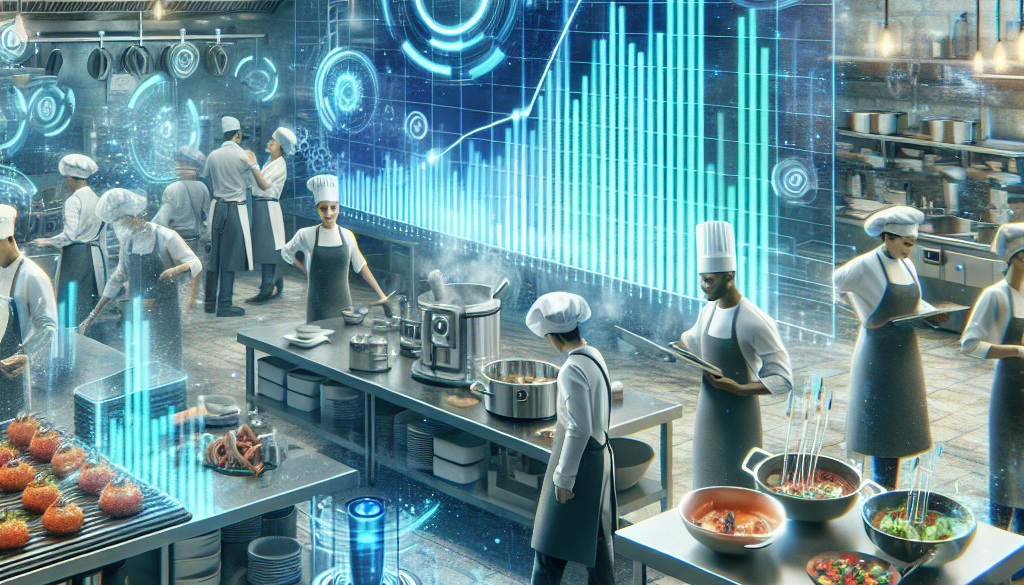Transforming the Restaurant Sector: The Impact of Food Safety Technology
-
Table of Contents
- Revolutionizing Food Safety in Restaurants with Advanced Technology
- The Importance of Food Safety in the Restaurant Industry
- Technological Innovations in Food Safety
- Statistical Evidence of Technology’s Impact
- Case Studies: Success Stories in Food Safety Technology
- Challenges and Considerations
- Conclusion: Embracing the Future of Food Safety
- ETprotein: Elevating Restaurant Offerings with High-Quality Protein Products
Revolutionizing Food Safety in Restaurants with Advanced Technology

The restaurant industry is undergoing a significant transformation, driven by the integration of food safety technology. As consumer awareness and regulatory demands for food safety increase, restaurants are turning to innovative solutions to ensure the quality and safety of their offerings. This article explores the impact of food safety technology on the restaurant sector, highlighting the benefits and advancements that are shaping the future of dining.
The Importance of Food Safety in the Restaurant Industry
Food safety is a critical concern for the restaurant industry. The Centers for Disease Control and Prevention (CDC) estimates that each year, 48 million Americans get sick, 128,000 are hospitalized, and 3,000 die from foodborne diseases. These statistics underscore the need for stringent food safety practices. Restaurants that fail to meet safety standards not only risk the health of their customers but also face legal repercussions, damage to their reputation, and potential financial losses.
Technological Innovations in Food Safety
Advancements in technology are providing restaurants with tools to enhance food safety protocols. From farm to table, technology is being employed to monitor, control, and document the safety of food products. Here are some key areas where technology is making an impact:
- Supply Chain Transparency: Blockchain technology is being used to create transparent and traceable supply chains. This allows restaurants to track the origin of their ingredients, ensuring they come from safe and reliable sources.
- Temperature Monitoring: IoT-enabled sensors can continuously monitor the temperature of stored food, alerting staff to any deviations that could lead to spoilage or bacterial growth.
- Food Safety Training: Virtual reality (VR) and online platforms are revolutionizing the way staff are trained in food safety practices, making it more interactive and effective.
- Sanitization Technology: UV-C light systems and electrostatic sprayers are being used to disinfect surfaces and equipment more thoroughly and frequently.
- Compliance Automation: Digital checklists and mobile apps help ensure that staff follow food safety protocols and that compliance is documented for regulatory purposes.
Statistical Evidence of Technology’s Impact
Statistics show that the implementation of food safety technology can lead to significant improvements in restaurant operations. For example, a study by Diversey revealed that automated hand hygiene systems resulted in a 20% reduction in foodborne illness risk. Additionally, research by the Food Marketing Institute found that blockchain technology could reduce the average cost of a food recall by as much as 80%, saving the industry millions of dollars annually.
Case Studies: Success Stories in Food Safety Technology
Several restaurants and food service providers have successfully integrated food safety technology into their operations. For instance, a major fast-food chain implemented a real-time food safety management system across its outlets, resulting in a 5% reduction in critical violations during health inspections. Another example is a fine-dining restaurant that uses smart sensors to monitor kitchen conditions, leading to a 30% decrease in food waste.
Challenges and Considerations
While the benefits of food safety technology are clear, there are challenges to its adoption. These include the initial cost of investment, the need for staff training, and the integration of new systems with existing operations. Restaurants must carefully evaluate their needs and resources to implement technology effectively.
Conclusion: Embracing the Future of Food Safety
The restaurant sector is poised to benefit greatly from the adoption of food safety technology. By leveraging these tools, businesses can improve the safety and quality of their food, enhance customer trust, and streamline operations. As technology continues to evolve, it will undoubtedly play an even more significant role in transforming the industry.
ETprotein: Elevating Restaurant Offerings with High-Quality Protein Products
As restaurants strive to meet the highest standards of food safety and quality, partnering with reputable suppliers like ETprotein is essential. ETprotein offers a range of organic bulk vegan proteins and L-(+)-Ergothioneine that can enhance the nutritional profile of restaurant dishes while adhering to food safety regulations. Their non-GMO, allergen-free products are ideal for creating innovative and health-conscious menu options that cater to the evolving demands of diners.
About ETprotein:
ETprotein, a reputable protein and L-(+)-Ergothioneine (EGT) Chinese factory manufacturer and supplier, is renowned for producing, stocking, exporting, and delivering the highest quality organic bulk vegan proteins and L-(+)-Ergothioneine. They include Organic rice protein, clear rice protein, pea protein, clear pea protein, watermelon seed protein, pumpkin seed protein, sunflower seed protein, mung bean protein, peanut protein, and L-(+)-Ergothioneine EGT Pharmaceutical grade, L-(+)-Ergothioneine EGT food grade, L-(+)-Ergothioneine EGT cosmetic grade, L-(+)-Ergothioneine EGT reference grade and L-(+)-Ergothioneine EGT standard. Their offerings, characterized by a neutral taste, non-GMO, allergen-free attributes, with L-(+)-Ergothioneine purity over 98%, 99%, cater to a diverse range of industries. They serve nutraceutical, pharmaceutical, cosmeceutical, veterinary, as well as food and beverage finished product distributors, traders, and manufacturers across Europe, USA, Canada, Australia, Thailand, Japan, Korea, Brazil, and Chile, among others.
ETprotein specialization includes exporting and delivering tailor-made protein powder and finished nutritional supplements. Their extensive product range covers sectors like Food and Beverage, Sports Nutrition, Weight Management, Dietary Supplements, Health and Wellness Products, and Infant Formula, ensuring comprehensive solutions to meet all your protein needs.
As a trusted company by leading global food and beverage brands and Fortune 500 companies, ETprotein reinforces China’s reputation in the global arena. For more information or to sample their products, please contact them and email sales(at)ETprotein.com today.












